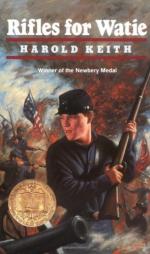|
This section contains 383 words (approx. 1 page at 400 words per page) |

|
The most striking literary quality in Rifles for Watte is its abundant historical detail. As Keith traces Jeff's development from a sixteen-year-old farm boy to a mature Union war veteran, he accurately recreates the routines and customs of the Civil War era. When Jeff is at home in Kansas, for example, he helps his father "thresh the wheat by hand, using two hickory clubs tied together with buckskin," and he and his family feast on " 'sweet toast,' homebaked wheat bread toasted in a pan over the fireplace coals." But when Jeff is in the field with his regiment, he learns about the grim realities of army life: when his friend Ford Ivey is wounded in the leg and has to have an amputation, Jeff watches the orderlies place him on a wooden table in a crowded, dirty tent, smells the "sweet odor of chloroform," and...
|
This section contains 383 words (approx. 1 page at 400 words per page) |

|




